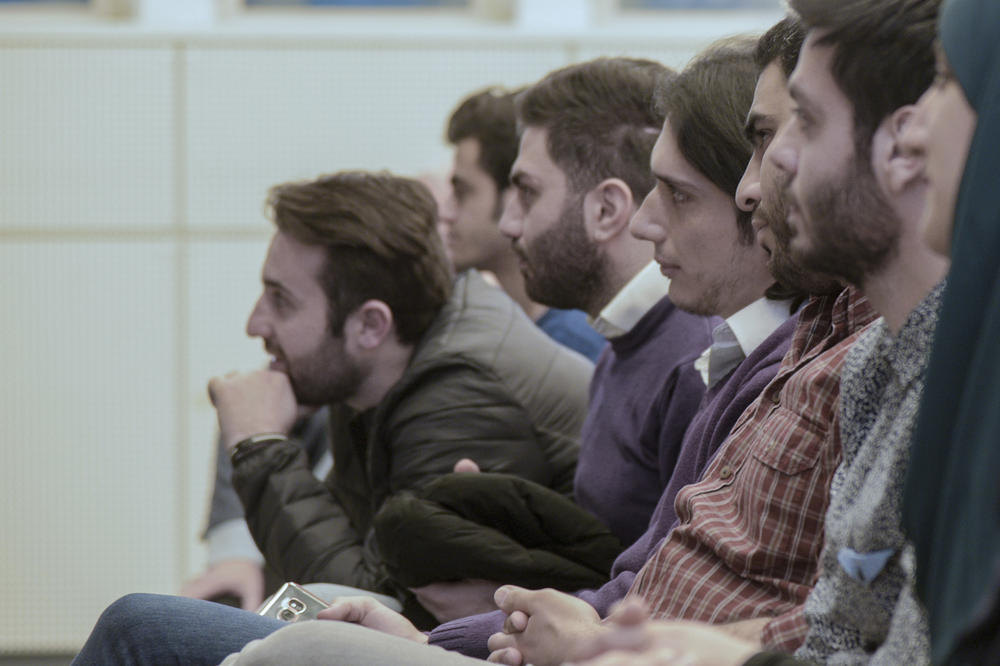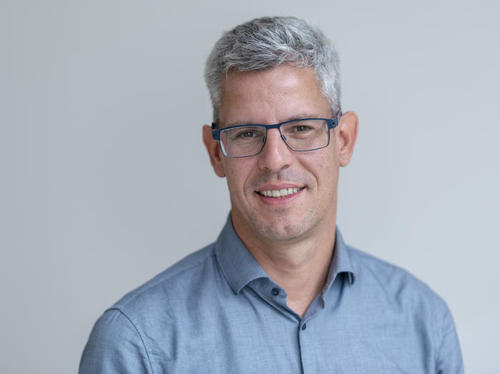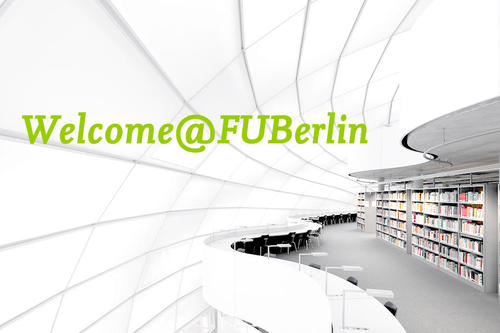Five Years of Welcome@FUBerlin
New Application Period as of July 6
Jun 23, 2020
Participants in the Studienkolleg preparatory course in 2017. Refugees interested in studying can prepare for the university by taking German classes and subject-specific courses.
Image Credit: Annika Middeldorf
Five years ago, in the fall of 2015, Freie Universität Berlin set up the Welcome@FUBerlin program, an extensive package of academic offerings and services aimed at making it easier for people who had to leave their homeland to gain access to study programs. Since then, more than 600 people have participated. The application period for the new round of courses opens on July 6. To mark this date as well as World Refugee Day on June 20, campus.leben conducted an interview with Florian Kohstall from the Center for International Cooperation at Freie Universität, who heads the Welcome Initiative.
Florian Kohstall heads the Welcome Initiative at Freie Universität Berlin. He has been coordinating the Welcome@FUBerlin program ever since it was first set up.
Image Credit: Bernd Wannenmacher
Mr. Kohstall, five years after the Welcome program was set up: Who takes advantage of the courses? Who do you want to reach?
The program is aimed at people who were unable to start or complete their university studies because they had to flee their home country. The aim is to prepare them language-wise and professionally for studying at Freie Universität Berlin.
We started the program in October 2015, directly after the so-called refugee summer, at first with 80 participants. By the 2016/17 winter semester, the first 16 were able to enroll in regular degree programs at Freie Universität. During the past four years we have prepared between 100 and 150 individuals each year who were interested in applying to degree programs.
Move closer together, please! The participants of the Studienkolleg preparatory course, organizers, and friends in the foyer of the Henry Ford building in February 2017.
Image Credit: Annika Middeldorf
What are the main priorities of the program compared with similar offers from other universities?
Our Welcome@FUBerlin programs opens up many new opportunities for those who have just arrived in Berlin. In addition to participating in language and college preparatory courses, they can also take part in regular seminars and lectures at Freie Universität. Having an opportunity to look into classes in different subjects helps when the individuals have not yet decided on a major.
In addition, the University Sports Center offers courses for refugees, and in our buddy program, students at Freie Universität support newcomers. They form tandems with participants in the welcome program and help them to settle in on campus and in everyday life. Our team advises potential students and participants in four languages and offers its own workshops and events.
Due to the corona pandemic, most of the events in the Welcome Program had to take place digitally. How did this affect the process?
We switched to digital teaching in March, but have returned to face-to-face teaching in compliance with the regulations that apply to schools in Berlin. The participants in the preparatory courses are about to take their final exams, so the pressure is enormous. Many do not have the same facilities at home as on campus.
We have of course switched most of the programs to digital formats and offer additional webinars. We still need to evaluate how this actually affects the success of the program.
The “Welcome@FUBerlin” program aims to facilitate access to university studies for people who have fled from crisis areas.
Image Credit: Freie Universität Berlin
Why was Welcome@FUBerlin set up five years ago?
There were already a number of initiatives at the university to support refugees. With the new program we wanted to bring them together and add to what was already in place.
The university also wanted to send a visible signal that it is fulfilling its responsibility toward society as a whole. With their diversity, universities are a particularly suitable place for people arriving in a new social environment. And they offer ideal opportunities for development for the many very well-educated refugees.
A brief summary of the first five years: What is going well, and what could be better?
During the past few years, there has not been a single year like the previous one. We constantly needed to adjust to new situations, such as the special situation of refugee women or the rapidly improving German language skills of the participants.
This year our program will be offered as a regular study preparation program for the first time. That is an important step in converting a special program into a standard program. We are aiming to offer people with a refugee background comparable opportunities as national or international students.
Even if the number of refugees who apply to our program has dropped from almost 1000 per year to about 200 per year, the issue will continue to concern us. This is reflected not only in the UNHCR Report. Our initiatives for refugee and vulnerable scholars such as Academics in Solidarity and the university’s involvement in Scholars at Risk and the Academy in Exile are – unfortunately – still very much in demand.
Christine Boldt conducted the interview.
Further Information
- For details about the Welcome@FUBerlin program, see www.fu-berlin.de/welcome




